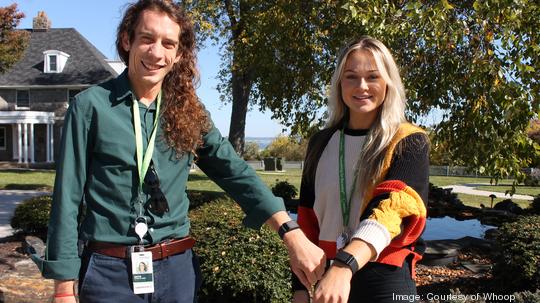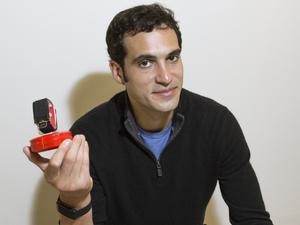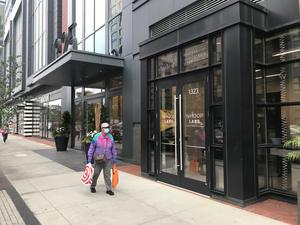
Boston-based Whoop is becoming a well-known name in the fitness industry, with professional athletes and fitness fans sporting its wristband. The company calls its product a wearable health and fitness coach.
Whoop’s connection to athletes is a no-brainer for a company founded by a former Harvard squash player. But ever since CEO Will Ahmed started Whoop, there’s been a growing interest in serving other groups, from athletic teams to businesses in other industries, according to Mark McLaughlin, chief business officer. McLaughlin has helped lead this growth over the past 18 months as Whoop put more focus on selling its products and services to organizations in areas like business and health care.
This morning, Whoop announced a new partnership with Ashley Addiction Treatment in Maryland to study recovery and relapse by combining Whoop’s health data with patient feedback. McLaughlin told BostInno that this announcement marks the company’s first formal relationship with an addiction treatment center outside of research support efforts.
“Our relationship with Ashley has been evolving since last year when we sort of started to pilot with them. But this is our most pervasive relationship with an addiction center,” McLaughlin said.
Building an “enterprise SaaS business”
In McLaughlin’s early conversations with Ahmed, he learned that the CEO had envisioned Whoop as more of a “team sale than an individual sale” when first founding the company.
“The genesis of the company was in what we’ll call B2B, but they’d sort of gotten away from it and obviously seen high growth in consumers,” McLaughlin said.
McLaughlin joined Whoop at the beginning of 2021 after serving as chief revenue officer at Roostify and vice president of business development at DocuSign. His job was to take the interest from companies and teams, and build that into a bigger part of the business.
Through its B2B business, called Whoop Unite, companies can provide their employees with Whoop’s wristbands, which track things like sleep, recovery and training. If employees opt into sharing this data, administrators can analyze it.
“We’ve evolved what is more of a true enterprise SaaS business where we can provide aggregated insights to the organization for those employees that opt into it and then actually drive to improvable value and outcomes,” McLaughlin said.
Among the groups with which Whoop is working are NCAA teams, businesses with high burn-out jobs — like nurses and first responders — and the U.S. military.
“You’ll see other areas that we’ll start to get into as we evolve where safety is an issue, whether it’s in construction workers, pilots and things like that,” McLaughlin said. “So, (for example), how do you manage pilot safety and flight schedules based on how they’re recovering based off their last flight?”
McLaughlin said Whoop has over 200 customers across industries, double the from 12 months ago.
New tech in addiction treatment
Whoop’s relationship with Ashley Addiction Treatment came about through Charlie Engle, the co-founder of Freedom From Addiction within the Chopra Foundation, McLaughlin said.
Engle is a recovering addict who used Whoop’s technology to track his own health data. McLaughlin said that Engle saw how this data could be useful for Ashley’s evidence-based treatment approach and helped kickstart a pilot program about a year ago.
Through this partnership, Whoop also realized it needed to make some changes to its offerings. The Whoop wristband required a phone to send its data to the cloud for users to see the data or analyze it. Typically, in addiction treatment centers, patients cannot have phones. The company built a workaround called Whoop Gateway which uses Bluetooth to retrieve biometric data from the wearable. Ashley is the first customer to use this technology.
“Across our business, there are going to be limitations of the phone, whether it’s in combat or while you’re playing sports or other things where you may not always be able to collect the data from the phone,” McLaughlin said.
Expansion into brick and mortar
Whoop also recently expanded into brick-and-mortar retail. Radha Bennett, vice president of retail and wholesale, said the company’s products are in over 250 stores at Best Buy and Dick’s locations.
“It was a good time for the business in the sense of wanting to be able to directly connect with consumers and meet those potential customers where they work and live,” Bennett said.
Bennett was previously chief of staff at Drizly and helped launch the experiential and retail channels at Wayfair. She joined Whoop at the beginning of this year to lead this launch. The company historically sold its products directly to consumers online.
Bennett said Whoop is looking to nurture its relationships with these retailers as they move into 2023, but the company is also in active conversation with other potential partners.
“We’re continuing to grow this part of the business alongside several other parts of the business, including international as well as our enterprise Whoop Unite business,” Bennett said. “I think what’s exciting is there are so many different verticals that we’re putting resourcing as well as excitement behind as an organization.”








